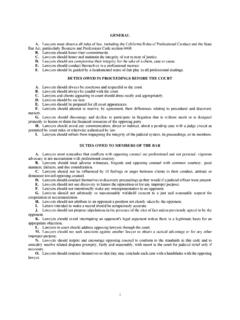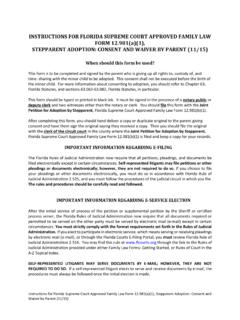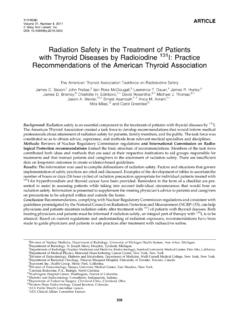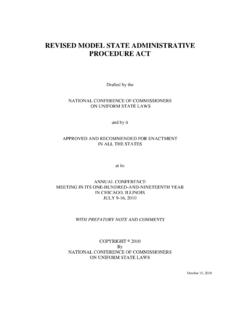Transcription of RULE 26 OF THE FEDERAL RULES OF CIVIL …
1 RULE 26 OF THE FEDERAL RULES OF CIVIL PROCEDURE: GENERAL PROVISIONS REGARDING DUSCOVERY; DUTY OF DISCLOSURE (a) Required Disclosures; Methods to Discover Additional Matter. (1) Initial Disclosures. Except in categories of proceedings specified in Rule 26(a)(1)(E), or to the extent otherwise stipulated or directed by order, a party must, without awaiting a discovery request, provide to other parties: (A) the name and, if known, the address and telephone number of each individual likely to have discoverable information that the disclosing party may use to support its claims or defenses, unless solely for impeachment, identifying the subjects of the information; (B) a copy of, or a description by category and location of, all documents, data compilations, and tangible things that are in the possession, custody, or control of the party and that the disclosing party may use to support its claims or defenses, unless solely for impeachment.
2 (C) a computation of any category of damages claimed by the disclosing party, making available for inspection and copying as under Rule 34 the documents or other evidentiary material, not privileged or protected from disclosure, on which such computation is based, including materials bearing on the nature and extent of injuries suffered; and (D) for inspection and copying as under Rule 34 any insurance agreement under which any person carrying on an insurance business may be liable to satisfy part or all of a judgment which may be entered in the action or to indemnify or reimburse for payments made to satisfy the judgment. (E) The following categories of proceedings are exempt from initial disclosure under Rule 26(a)(1) : (i) an action for review on an administrative record; (ii) a petition for habeas corpus or other proceeding to challenge a criminal conviction or sentence; (iii) an action brought without counsel by a person in custody of the United States, a state, or a state subdivision; (iv) an action to enforce or quash an administrative summons or subpoena; (v) an action by the United States to recover benefit payments; (vi) an action by the United States to collect on a student loan guaranteed by the United States; (vii) a proceeding ancillary to proceedings in other courts; and (viii) an action to enforce an arbitration award.
3 These disclosures must be made at or within 14 days after the Rule 26(f) conference unless a different time is set by stipulation or court order, or unless a party objects during the conference that initial disclosures are not appropriate in the circumstances of the action and states the objection in the Rule 26(f) discovery plan. In ruling on the objection, the court must determine what disclosures - if any - are to be made, and set the time for disclosure. Any party first served or otherwise joined after the Rule 26(f) conference must make these disclosures within 30 days after being served or joined unless a different time is set by stipulation or court order. A party must make its initial disclosures based on the information then reasonably available to it and is not excused from making its disclosures because it has not fully completed its investigation of the case or because it challenges the sufficiency of another party's disclosures or because another party has not made its disclosures.
4 (2) Disclosure of Expert Testimony. (A) In addition to the disclosures required by paragraph (1), a party shall disclose to other parties the identity of any person who may be used at trial to present evidence under RULES 702, 703, or 705 of the FEDERAL RULES of Evidence. (B) Except as otherwise stipulated or directed by the court, this disclosure shall, with respect to a witness who is retained or specially employed to provide expert testimony in the case or whose duties as an employee of the party regularly involve giving expert testimony, be accompanied by a written report prepared and signed by the witness. The report shall contain a complete statement of all opinions to be expressed and the basis and reasons therefor; the data or other information considered by the witness in forming the opinions; any exhibits to be used as a summary of or support for the opinions; the qualifications of the witness, including a list of all publications authored by the witness within the preceding ten years; the compensation to be paid for the study and testimony; and a listing of any other cases in which the witness has testified as an expert at trial or by deposition within the preceding four years.
5 (C) These disclosures shall be made at the times and in the sequence directed by the court. In the absence of other directions from the court or stipulation by the parties, the disclosures shall be made at least 90 days before the trial date or the date the case is to be ready for trial or, if the evidence is intended solely to contradict or rebut evidence on the same subject matter identified by another party under paragraph (2)(B), within 30 days after the disclosure made by the other party. The parties shall supplement these disclosures when required under subdivision (e)(1). (3) Pretrial Disclosures. In addition to the disclosures required by Rule 26(a)(1) and (2) , a party must provide to other parties and promptly file with the court the following information regarding the evidence that it may present at trial other than solely for impeachment: (A) the name and, if not previously provided, the address and telephone number of each witness, separately identifying those whom the party expects to present and those whom the party may call if the need arises; (B) the designation of those witnesses whose testimony is expected to be presented by means of a deposition and, if not taken stenographically, a transcript of the pertinent portions of the deposition testimony.
6 And (C) an appropriate identification of each document or other exhibit, including summaries of other evidence, separately identifying those which the party expects to offer and those which the party may offer if the need arises. Unless otherwise directed by the court, these disclosures must be made at least 30 days before trial. Within 14 days thereafter, unless a different time is specified by the court, a party may serve and promptly file a list disclosing (i) any objections to the use under Rule 32(a) of a deposition designated by another party under Rule 26(a)(3)(B), and (ii) any objection, together with the grounds therefor, that may be made to the admissibility of materials identified under Rule 26(a)(3)(C). Objections not so disclosed, other than objections under RULES 402 and 403 of the FEDERAL RULES of Evidence, are waived unless excused by the court for good cause. (4) Form of Disclosures. Unless the court orders otherwise, all disclosures under RULES 26(a)(1) through (3) must be made in writing, signed, and served.
7 (5) Methods to Discover Additional Matter. Parties may obtain discovery by one or more of the following methods: depositions upon oral examination or written questions; written interrogatories; production of documents or things or permission to enter upon land or other property under Rule 34 or 45(a)(1) (C), for inspection and other purposes; physical and mental examinations; and requests for admission. (b) Discovery Scope and Limits. Unless otherwise limited by order of the court in accordance with these RULES , the scope of discovery is as follows: (1) In General. Parties may obtain discovery regarding any matter, not privileged, that is relevant to the claim or defense of any party, including the existence, description, nature, custody, condition, and location of any books, documents, or other tangible things and the identity and location of persons having knowledge of any discoverable matter. For good cause, the court may order discovery of any matter relevant to the subject matter involved in the action.
8 Relevant information need not be admissible at the trial if the discovery appears reasonably calculated to lead to the discovery of admissible evidence. All discovery is subject to the limitations imposed by Rule 26(b)(2)(i), (ii), and (iii). (2) Limitations. By order, the court may alter the limits in these RULES on the number of depositions and interrogatories or the length of depositions under Rule 30 . By order or local rule, the court may also limit the number of requests under Rule 36 . The frequency or extent of use of the discovery methods otherwise permitted under these RULES and by any local rule shall be limited by the court if it determines that: (i) the discovery sought is unreasonably cumulative or duplicative, or is obtainable from some other source that is more convenient, less burdensome, or less expensive; (ii) the party seeking discovery has had ample opportunity by discovery in the action to obtain the information sought; or (iii) the burden or expense of the proposed discovery outweighs its likely benefit, taking into account the needs of the case, the amount in controversy, the parties' resources, the importance of the issues at stake in the litigation, and the importance of the proposed discovery in resolving the issues.
9 The court may act upon its own initiative after reasonable notice or pursuant to a motion under Rule 26(c) . (3) Trial Preparation: Materials. Subject to the provisions of subdivision (b)(4) of this rule, a party may obtain discovery of documents and tangible things otherwise discoverable under subdivision (b)(1) of this rule and prepared in anticipation of litigation or for trial by or for another party or by or for that other party's representative (including the other party's attorney, consultant, surety, indemnitor, insurer, or agent) only upon a showing that the party seeking discovery has substantial need of the materials in the preparation of the party's case and that the party is unable without undue hardship to obtain the substantial equivalent of the materials by other means. In ordering discovery of such materials when the required showing has been made, the court shall protect against disclosure of the mental impressions, conclusions, opinions, or legal theories of an attorney or other representative of a party concerning the litigation.
10 A party may obtain without the required showing a statement concerning the action or its subject matter previously made by that party. Upon request, a person not a party may obtain without the required showing a statement concerning the action or its subject matter previously made by that person. If the request is refused, the person may move for a court order. The provisions of Rule 37(a)(4) apply to the award of expenses incurred in relation to the motion. For purposes of this paragraph, a statement previously made is (A) a written statement signed or otherwise adopted or approved by the person making it, or (B) a stenographic, mechanical, electrical, or other recording, or a transcription thereof, which is a substantially verbatim recital of an oral statement by the person making it and contemporaneously recorded. (4) Trial Preparation: Experts. (A) A party may depose any person who has been identified as an expert whose opinions may be presented at trial.






